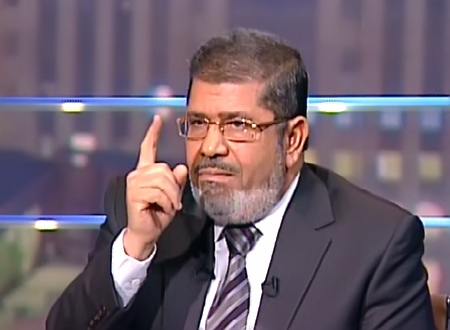On the eve of the trial, gunmen shot dead two policemen and injured a third near Ismailia on the west bank of the Suez Canal, security sources said late Sunday.
Morsi, who has been held by the army at a secret location since his July 3 ouster, is accused along with 14 others of inciting the murder of protesters outside the presidential palace in December 2012.
The charges against Morsi could lead to the death penalty or life in prison.
The country is on high alert ahead of the trial, with 20,000 policemen to be deployed and authorities saying they are ready to deal with any outbreak of violence.
With more than 1,000 people killed since Morsi's overthrow and thousands of Islamists arrested, hopes for a political settlement between the Islamists and the interim government already are slim.
"Morsi's presence in the court will definitely energise his supporters and raise possibilities of new protests and clashes," said Shadi Hamid, director of research at the Brookings Doha Center.
'First and foremost a political trial'
The trial will be seen as a test for Egypt's new authorities, who have come under fire from rights groups for their heavy-handed approach in dealing with dissent.
"They should present Mohamed Morsi in court and grant him a fair trial, including the right to challenge the evidence against him in court," Amnesty International's Hassiba Hadj Sahraoui said in a statement.
"Failing to do so would further call into question the motives behind his trial."
But analysts believe the political nature of the trial will drive its outcome.
"This is first and foremost a political trial and an important one. There is zero chance of it being free and fair," Hamid said.
"The trial is a clear reminder of a polarised Egyptian society at this moment of time," he said.
Egypt's foreign ministry spokesman Badr Abdelatty told reporters over the weekend that Morsi will be "tried before a judge according to Egyptian penal code".
"Nothing extraordinary, nothing exceptional. He will have rights to have a free and fair trial."
Morsi will be tried in a police complex in east Cairo where longtime strongman Hosni Mubarak is also being prosecuted.
Morsi's stormy rule came to an abrupt end in a military overthrow after millions took to the streets to demand his resignation.
A senior leader of the influential and long-banned Muslim Brotherhood, his victory was made possible by the popular uprising of 2011 that toppled Mubarak and propelled Islamist movements to the foreground of the political arena.
His year-long stint in power, as Egypt's first civilian democratically elected president, was marred by political turmoil, deadly clashes and a crippling economic crisis.
Accused of failing ideals of revolution
In November 2012, Morsi issued a decree granting himself sweeping powers, prompting accusations of a power grab, as opponents accused him of failing the ideals of the revolution that ousted Mubarak.
The decree was a turning point in Morsi's rule, launching the worst polarisation in the country's recent history.
A month later, deadly clashes erupted outside the presidential palace between supporters and opponents of the Islamist leader. Morsi is accused of inciting that violence.
Accusing police of failing to protect the president, the Muslim Brotherhood called on supporters to confront the protesters. At least seven people were killed in the clashes that erupted on December 5 last year.
According to relatives and the few officials who were given access to him since his detention, Morsi remains defiant.
Unlike his predecessor Mubarak, also on trial facing similar charges, he will not cooperate with the court, said the Islamist Anti-Coup Alliance backing Morsi.
The deposed president "does not recognise the authority of the court," it said in a statement.
His lawyers will attend the hearing only as observers, it added.
--------------------------------------------------------------------------------------------------
Morsi, who has been held by the army at a secret location since his July 3 ouster, is accused along with 14 others of inciting the murder of protesters outside the presidential palace in December 2012.
The charges against Morsi could lead to the death penalty or life in prison.
The country is on high alert ahead of the trial, with 20,000 policemen to be deployed and authorities saying they are ready to deal with any outbreak of violence.
With more than 1,000 people killed since Morsi's overthrow and thousands of Islamists arrested, hopes for a political settlement between the Islamists and the interim government already are slim.
"Morsi's presence in the court will definitely energise his supporters and raise possibilities of new protests and clashes," said Shadi Hamid, director of research at the Brookings Doha Center.
'First and foremost a political trial'
The trial will be seen as a test for Egypt's new authorities, who have come under fire from rights groups for their heavy-handed approach in dealing with dissent.
"They should present Mohamed Morsi in court and grant him a fair trial, including the right to challenge the evidence against him in court," Amnesty International's Hassiba Hadj Sahraoui said in a statement.
"Failing to do so would further call into question the motives behind his trial."
But analysts believe the political nature of the trial will drive its outcome.
"This is first and foremost a political trial and an important one. There is zero chance of it being free and fair," Hamid said.
"The trial is a clear reminder of a polarised Egyptian society at this moment of time," he said.
Egypt's foreign ministry spokesman Badr Abdelatty told reporters over the weekend that Morsi will be "tried before a judge according to Egyptian penal code".
"Nothing extraordinary, nothing exceptional. He will have rights to have a free and fair trial."
Morsi will be tried in a police complex in east Cairo where longtime strongman Hosni Mubarak is also being prosecuted.
Morsi's stormy rule came to an abrupt end in a military overthrow after millions took to the streets to demand his resignation.
A senior leader of the influential and long-banned Muslim Brotherhood, his victory was made possible by the popular uprising of 2011 that toppled Mubarak and propelled Islamist movements to the foreground of the political arena.
His year-long stint in power, as Egypt's first civilian democratically elected president, was marred by political turmoil, deadly clashes and a crippling economic crisis.
Accused of failing ideals of revolution
In November 2012, Morsi issued a decree granting himself sweeping powers, prompting accusations of a power grab, as opponents accused him of failing the ideals of the revolution that ousted Mubarak.
The decree was a turning point in Morsi's rule, launching the worst polarisation in the country's recent history.
A month later, deadly clashes erupted outside the presidential palace between supporters and opponents of the Islamist leader. Morsi is accused of inciting that violence.
Accusing police of failing to protect the president, the Muslim Brotherhood called on supporters to confront the protesters. At least seven people were killed in the clashes that erupted on December 5 last year.
According to relatives and the few officials who were given access to him since his detention, Morsi remains defiant.
Unlike his predecessor Mubarak, also on trial facing similar charges, he will not cooperate with the court, said the Islamist Anti-Coup Alliance backing Morsi.
The deposed president "does not recognise the authority of the court," it said in a statement.
His lawyers will attend the hearing only as observers, it added.
--------------------------------------------------------------------------------------------------









 Home
Home Politics
Politics











